(and Other Shady Author Scams)
An excellent article provided by Reedsy.
Becoming a published author is a dream shared by almost every writer. Unfortunately, there are plenty of unreliable companies out there looking to make a quick buck by exploiting those dreams. To help you protect your work, your bank account, and your dignity, here are the types of shady companies and book publishers you should avoid:
1. Vanity presses pretending to be traditional publishers
Who wouldn’t love it if a publisher offers to reprint one of your self-published titles or publish your next book, right? You might even be happy to pay some fees to get the ball rolling on the production process.
But that would be a big mistake. No legitimate traditional publisher would ask you to foot the bill. In fact, when acquiring your book, they will pay you an advance. So nine out of ten times, if a publisher asks you to pay to be published, it is a vanity press.
Some massively prolific vanity presses you may wish to avoid include:
- Page Publishing
- Xlibris
- Author Solutions
Some scammers even masquerade under the name of Big Five imprints. A well-known cluster of scammers is the Filipino network previously associated with Authors Solution and now operates separately. In the early months of the Covid-19 pandemic, they started targeting desperate authors with a “publishing package” that cost exactly the same amount as that received by US citizens in their federal stimulus check.
These days, it isn’t enough to simply learn the names of unreliable publishers. New vanity presses seem to set up shop each month — and with no “bad press” associated with their names, they’re able to convince many authors to pay for their services. To understand why publishing with a vanity press is a terrible idea, head on over to the next post in this guide, which discusses the dangers of “paying to publish”.
If you want to work with reliable publishers, browse our catalog of independent presses, all of which have been thoroughly vetted. Sometimes vanity presses pose as hybrid publishers, so head to our post on hybrid publishing to understand that model better.
Pro-tip: Wondering whether to self-publish or traditionally publish? Take this free 10-day course to understand your choices.

FREE COURSE
Self-Publishing vs. Traditional Publishing
Make the informed choice with our free 10-day course.
2. ‘Literary agents’ promising book deals
Another kind of scam you might be dealing with is an agent scam. If a literary agent unsolicitedly contacts you to offer you a book deal with a publisher, or asks you to pay a reading fee, your spidey-sense should be tingling pretty hard.
Firstly, literary agents won’t ever contact you directly — unless you’re already a wildly successful author (and even then, most reputable agents would avoid poaching you from your current representation). If you belong to the 99% of authors who’ve yet to achieve major success, the only way to get an agent to represent you and your book is to send them a query letter.
Secondly, your agent should never ask you to pay for anything. Even if they help you polish your manuscript before submitting it to publishers, it should not come with a charge. Agents work on commission, meaning the only time you pay them is when they’ve successfully helped sell your book to a publisher.
If an agent contacts you out of the blue (and you aren’t already a bestselling author), they’re probably not 100% legit.
When it comes to agents, it’s best to stick to vetted lists like that of the Association of Author Representatives or our directory of almost 700 literary agents across the world. Don’t come close to anyone without a proven track record!
Are you suspicious of a certain company? Take this short quiz, which will help you sniff out a predatory business.
Are you dealing with a publishing scam?
Take this quick quiz to see if you’re dealing with a legit publishing company.
3. Grossly overpriced self-publishing services
Though self-publishing, by definition, means that you’re doing it yourself, there are companies out there who can give you a hand. In fact, it’s advisable to get editing and designing services from reliable professionals to make sure your book is of top quality.
However, if you don’t have your guard up, it is easy to fall for predators who simply want to overcharge for their services — many of which are tasks you could accomplish on your own. Here are some such ‘services’ to avoid.
Marked-up prices for low-quality editing and designing
Editors and designers are essential to a book’s success — and some companies and individuals will exploit this fact to take money out of your pocket. The worst thing is that they may even quote reasonable costs for self-publishing services, leaving you unsuspecting at first, and then end up delivering low-quality work.

How to Self-Publish a Book
Learn to set yourself up for success as an indie author.
When it comes to cover designers and illustrators, it can be easier to tell who’s actually a pro — since their artwork is clearly visible. However, with editors and book coaches, whose work is invisible to the reader (if they’ve done their job right), you have to do some research before signing a contract with them. Or… you can search for professionals on Reedsy.
At Reedsy, we vet each professional by verifying their professional experience, ensuring that every freelancer on our platform either has a wealth of traditional publishing experience, or is a seasoned and well-reviewed collaborator on indie books. To find out more about how Reedsy chooses its professionals, read more about our selection criteria here.

MEET THE BEST PUBLISHING PROFESSIONALS
Polish your book with expert help
Getting your book an ISBN
The acronym may make it sound more complicated than it is, but getting an International Standard Book Number (ISBN) is not like joining the Illuminati: you don’t need a special introduction or to be someone’s important grandchild. For $125, any author can buy an ISBN through Bowker in the USA or Nielsen in the UK: agencies that issue ISBNs and cannot profit from their sale.
However, there are plenty of companies who will make a big song and dance about securing you an ISBN, charging you hundreds of dollars on top of the actual cost — when you could just spend 10 minutes on Bowker and do it yourself.
To be honest, most online retailers for indie authors will supply their own identification codes these days. If you’re not planning to distribute to brick-and-mortar stores, you’ll probably be fine without an ISBN. But if you simply must have one, check out our guide on how to get one without paying more than you need to.
Copyright registration
 Did you know that if you don’t register the copyright of your book, literally anybody could claim it as their work and profit from it?
Did you know that if you don’t register the copyright of your book, literally anybody could claim it as their work and profit from it?
Now, that’s entirely false, but you’d be surprised how many people believe it. Authors own the copyright to their works before and after they publish them. In the US, registering that copyright simply provides a few statutory rights when it comes to claiming damages — and it should only cost you $45 to apply for it online (as of February 2022). For more details on how to register your copyright, you can check out this comprehensive guide.
4. Marketing packages that sound essential
Selling a book is something that most authors struggle with. (For a primer on the topic, check out this guide.) So it’s no surprise that there are people who will offer to solve your marketing problems for a low, low fee. Let’s dig into some of the miraculous “marketing solutions” that authors are often sold:
Press Releases. Whenever a company has a big new “story” to push, they will put out a press release and publish it on sites on which the media can pick it up. Scam companies will sell you on the idea that the New York Times, Good Morning America, and Newsweek can pick up on your story — but the chances of that actually happening are very slim.
Book Fairs. Every year, the publishing world flock to a handful of book fairs where the rights to publish new titles are snapped up. The big ones are in London and Frankfurt (and Bologna for children’s books), and almost anyone can book a table at these events. Predatory companies will offer to display your book at one of these fairs for a fee. More often than not, yours will be one of the countless books on a table in some unseen corner of the convention floor.
Screenplay adaptations/coverage. Certain publishing companies will offer to write up a “coverage” package to make it easier to sell your book to Hollywood production companies. Others will even get an anonymous screenwriter to adapt it into a Netflix pilot. There’s never been any evidence of successful pitches, but these services will surely cost you a pretty penny.
If you do need someone to help you market your book, make sure they offer services that have a direct impact on your ability to reach your target reader (things like digital advertising and mailing list growth). Avoid companies that offer grand (yet vague) promises of instant stardom.

GET MARKETING HELP
Meet marketing wizards
Boost book sales with ads, social media strategy, and other marketing magic.
5. Writing contests and awards no one has heard of
Writing contests are a great way to reach an audience, solidify your writing credentials, and even make a little money in the form of prizes. There are, however, competitions that are little more than money-spinning enterprises. And you can usually sniff them out by the fact that their prizes are not really prizes.

Some contests will publish winning entries in a magazine or an anthology — which is great. But sometimes, “winning” authors will be obliged to pay an “editing fee” for that privilege — which is not great.
There are also some competitions in which the prize might be a trophy. The catch here is that the author will be expected to pay for the cost of the physical prize. This isn’t necessarily bad — unless you mind paying $80 for a slab of acrylic dozens more have also “won” that month.
In short, read the fine print. To find contests that have been vetted, you can look through this directory of the best writing competitions.
And that covers most of the publishing companies you want to steer clear of in your career as an author.
In the next post, we’ll take a deeper dive into vanity presses, since they can be quite tricky to spot.

